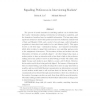Free Online Productivity Tools
i2Speak
i2Symbol
i2OCR
iTex2Img
iWeb2Print
iWeb2Shot
i2Type
iPdf2Split
iPdf2Merge
i2Bopomofo
i2Arabic
i2Style
i2Image
i2PDF
iLatex2Rtf
Sci2ools
129
Voted
DAGSTUHL
2007
2007
Signalling Preferences in Interviewing Markets
The process of match formation in matching markets can be divided into three parts: information sharing, investments in information acquisition, and the formation of matches based on available information. The last stage where agents are assumed to know their preferences has been studied in seminal work of Gale and Shapley (1962), and a model of second stage costly information acquisition is introduced and studied in Lee and Schwarz (2007). This paper focuses on the ’¼ürst stage ŌĆō information sharing ŌĆō and examines mechanisms which allow workers to signal their preferences over matching partners prior to the assignment of interviews. The incentives of ’¼ürms and workers vis-a-vis information revelation are partially aligned ŌĆō all other things being equal, a worker prefers to have an interview with a ’¼ürm that is high in his preference ranking and a ’¼ürm prefers to invest in interviewing a worker who ranks a ’¼ürm highly because such worker is more likely to accept a job if o’¼...
| Added | 29 Oct 2010 |
| Updated | 29 Oct 2010 |
| Type | Conference |
| Year | 2007 |
| Where | DAGSTUHL |
| Authors | Robin S. Lee, Michael A. Schwarz |
Comments (0)

